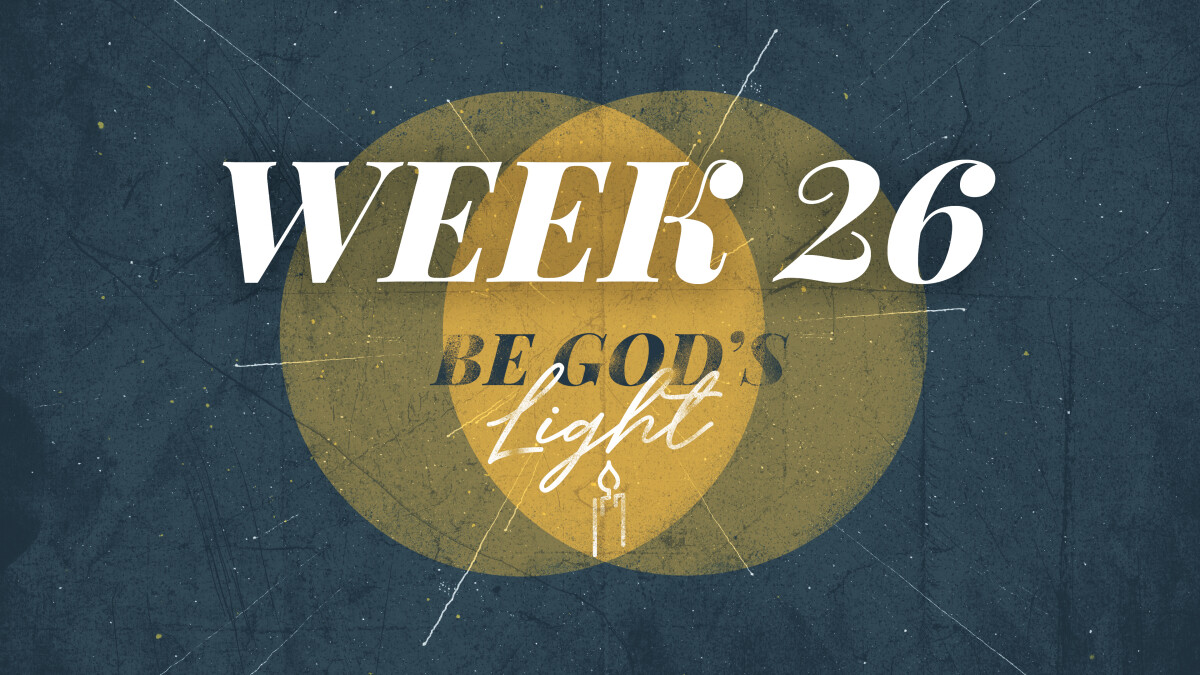July 05, 2024 | Be God's Light

God Feeds Elijah by a Raven and a Poor Widow
Scripture: 1 Kings 17(NIV)
1 Now Elijah the Tishbite, from Tishbe in Gilead, said to Ahab, “As the Lord, the God of Israel, lives, whom I serve, there will be neither dew nor rain in the next few years except at my word.”
2 Then the word of the Lord came to Elijah: 3 “Leave here, turn eastward and hide in the Kerith Ravine, east of the Jordan. 4 You will drink from the brook, and I have directed the ravens to supply you with food there.”
5 So he did what the Lord had told him. He went to the Kerith Ravine, east of the Jordan, and stayed there. 6 The ravens brought him bread and meat in the morning and bread and meat in the evening, and he drank from the brook.
7 Some time later the brook dried up because there had been no rain in the land. 8 Then the word of the Lord came to him: 9 “Go at once to Zarephath in the region of Sidon and stay there. I have directed a widow there to supply you with food.” 10 So he went to Zarephath. When he came to the town gate, a widow was there gathering sticks. He called to her and asked, “Would you bring me a little water in a jar so I may have a drink?” 11 As she was going to get it, he called, “And bring me, please, a piece of bread.”
12 “As surely as the Lord your God lives,” she replied, “I don’t have any bread—only a handful of flour in a jar and a little olive oil in a jug. I am gathering a few sticks to take home and make a meal for myself and my son, that we may eat it—and die.”
13 Elijah said to her, “Don’t be afraid. Go home and do as you have said. But first make a small loaf of bread for me from what you have and bring it to me, and then make something for yourself and your son. 14 For this is what the Lord, the God of Israel, says: ‘The jar of flour will not be used up and the jug of oil will not run dry until the day the Lord sends rain on the land.’”
15 She went away and did as Elijah had told her. So there was food every day for Elijah and for the woman and her family. 16 For the jar of flour was not used up and the jug of oil did not run dry, in keeping with the word of the Lord spoken by Elijah.
17 Some time later the son of the woman who owned the house became ill. He grew worse and worse, and finally stopped breathing. 18 She said to Elijah, “What do you have against me, man of God? Did you come to remind me of my sin and kill my son?”
19 “Give me your son,” Elijah replied. He took him from her arms, carried him to the upper room where he was staying, and laid him on his bed. 20 Then he cried out to the Lord, “Lord my God, have you brought tragedy even on this widow I am staying with, by causing her son to die?” 21 Then he stretched himself out on the boy three times and cried out to the Lord, “Lord my God, let this boy’s life return to him!”
22 The Lord heard Elijah’s cry, and the boy’s life returned to him, and he lived. 23 Elijah picked up the child and carried him down from the room into the house. He gave him to his mother and said, “Look, your son is alive!”
24 Then the woman said to Elijah, “Now I know that you are a man of God and that the word of the Lord from your mouth is the truth.”
Devotional
For the next two weeks, we turn our attention to the northern kingdom of Israel. King Jeroboam had set the standard of evil practices, only to be followed by six other kings spanning the next thirty-five years who did the same. Israel was off to a terrible start. A common phrase for these kings is like this one: “But Omri did evil in the eyes of the Lord and sinned more than all those before him. He followed completely the ways of Jeroboam son of Nebat, committing the same sin Jeroboam had caused Israel to commit, so that they aroused the anger of the Lord, the God of Israel, by their worthless idols” (1 Kings 16:25-26).
After those six kings, a man named Ahab rose to power as Israel’s king. His life would be summed up by his introductory bio in 1 Kings 16:30-33, “Ahab son of Omri did more evil in the eyes of the Lord than any of those before him. He not only considered it trivial to commit the sins of Jeroboam son of Nebat, but he also married Jezebel daughter of Ethbaal king of the Sidonians, and began to serve Baal and worship him. He set up an altar for Baal in the temple of Baal that he built in Samaria. Ahab also made an Asherah pole and did more to arouse the anger of the Lord, the God of Israel, than did all the kings of Israel before him.”
To counter these evil practices, God raised up the prophet Elijah. He would have a difficult task, trying to get Ahab and the worshipers of Baal and Asherah to turn their hearts back toward the Lord. For strength, Elijah would have to be completely dependent upon God.
Think about the miracles described in this chapter. What was miraculous about the drought? How was Elijah being fed by ravens illogical and impossible? This miracle took place near his hometown of Tishbe in the Kerith Ravine.
Then Elijah was instructed to go to the land of the Phoenicians, in Zarephath in the region of Sidon, near the hometown of Jezebel who had married King Ahab. What happened there with the woman who offered Elijah her last bit of flour and oil? Why did God allow the boy to die then be restored to life by the actions of Elijah? How might all these miracles have built Elijah’s faith to be a prophet during the reign of Ahab?
Nine hundred years later, Jesus was in his own hometown of Nazareth, which was in the territory once ruled by Ahab. One Sabbath, he stood up in the synagogue and read a prophecy from the Old Testament. Then He said, “Today this scripture is fulfilled in your hearing” (Luke 4:21). Jesus knew that the locals would want the hometown hero to do miracles in their presence. Here is His response:
“Truly I tell you… no prophet is accepted in his hometown. I assure you that there were many widows in Israel in Elijah’s time, when the sky was shut for three and a half years and there was a severe famine throughout the land. Yet Elijah was not sent to any of them, but to a widow in Zarephath in the region of Sidon” (Luke 4:24-26).
This response made his boyhood neighbors, friends, and relatives so furious that they tried to throw him off a cliff. What is the message weaving through the Old and New Testaments in these stories? What is the application for our lives today?
Poem
'Til The Ravens Do Come
Along this life’s journey, this wilderness land,
A hunger and thirst will occur
For this world is barren, its cisterns are foul
Its ground trampled, rocky, o’ergrown.
The seeds of your faith will need fight to produce
When fountain dries, locusts do swarm;
Cry out loud for manna, share last flour and oil,
Trust God will feed even in drought.
Let not grief nor doubt keep you down, but on knees
Like dogs, feed on Lord’s table’s crumbs;
For it is enough, daily manna, God’s word,
And wait ‘til the ravens do come.

